The Real Jurassic Park: Geological Explorations in Southwest England
University of Washington, Tacoma
TESC 417: Summer 2006
The Real Jurassic Park: Geology field course along the south coast of England (TESC 417)
Home
Location: West Bay
Introduction:
August 2, 2006--Our morning had been spent in Lyme Regis studying paleoecology and sedimentology with Dr. Dorothy Satterfield and Dr. Roger
Suthren and we were now ready to travel eastward from Lyme Regis along the coast to West Bay (also referred to as Bridport Bay). West Bay is
situated where a river valley intersects the cliffs of the Jurassic Coast and is located at the western end of Chesil Beach.
Detail Map:
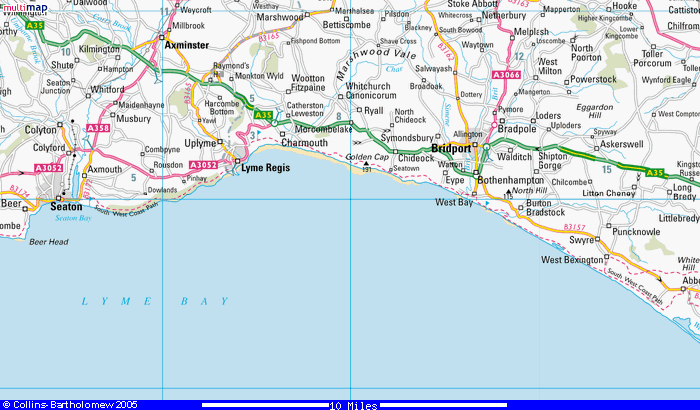
Highlights:
West Bay is a small resort town with a harbor that was built in 1722. It is a popular tourist town with fishing and beach activities and a great place to view
beautiful sea cliffs and study sedimentology. The cliff exposures are outcrops from the Lower Jurassic period and are striking high, red cliffs
that look like beautiful natural sculptures looming upwards toward the sky. We were fortunate to have Dr. Dorothy Satterfield and Dr. Roger Suthren to
help us understand the cliff formations and how these beds were laid down. On a historical note, in 1403 Joan of Navarre passed through West Bay enroute to marry King Henry IV.
(Ian West, 2006).
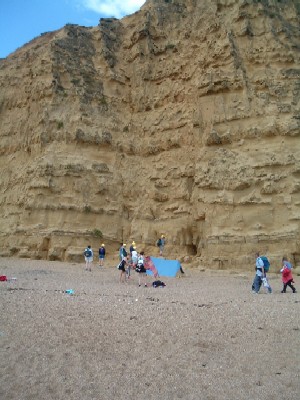 Class with Dr. Dorothy Satterfield and Dr. Roger Suthren at West Bay
Class with Dr. Dorothy Satterfield and Dr. Roger Suthren at West Bay
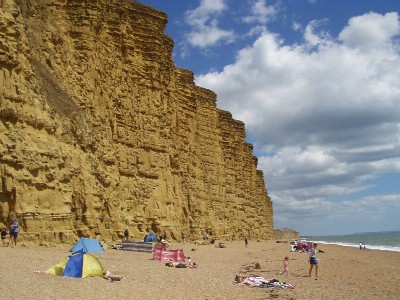 Bridport Sands formations from the Upper Lias age at West Bay
Bridport Sands formations from the Upper Lias age at West Bay
Synopsis of Area:
This area is part of the Lower Jurassic system of West Dorset and contains the Bridport Sands of the Upper Lias--one of the major sandstones in the Jurassic sequence
in Dorset and of importance as an oil reservoir rock. The Bridport Sands are 43m thick and have an average sedimentation rate of approximately
twenty thousand years per meter. West Bay sits between two cliffs, East Cliff and West Cliff. The vertical East Cliff has clean exposures at the
base which are fossiliferous in places and from the top of this cliff, you can see excellent exposures of the Lias and overlying Cretaceous to the west. You can
also see the erosion problems at the mouth of the harbor. Moving farther west of the harbor are the Middle Jurassic Frome Clays as well as some Forest Marble.
(Ian West, Bridgport Harbor).
The high part of the cliff exposes Bridport Sands with cyclical carbonate-cemented horizons.
The sands contain trace fossils, ammonites and belemnites. You can see the weathering of the harder bands which project and show honeycomb
weathering. The beach which is at the western end of the Chesil Beach is fine shingle. It consists of Cretaceous chert and flint which is from the Upper Greensands
and contains a variety of pebbles. These pebbles include quartzites from the Budleigh Salterton pebble beds of the Triassic age and are small and well-rounded.
(Ian West, Burton Bradstock - near Bridport, Dorset).
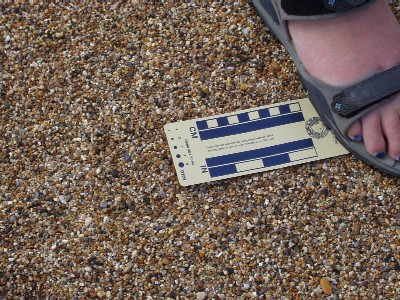
Burton Bradstock pebbles--and Alison's foot. The overall grading of the beach is from pea sized pebbles at West Bay to cobbles at Chesil Beach.
Summary:
Our purpose for visiting this
area was to study sedimentology with the help and expertise from Dr. Dorothy Satterfield and Dr. Roger Suthren. It was an exceptionally windy day and the sand was blowing
in our faces. However, this didn't keep us away and we enjoyed class on the beach and the beautiful views of the West Bay cliffs. We
studied the major rock type (sandstone) and discussed how it differed from the rocks we had seen earlier that day at Lyme Regis. We tested
for calcium carbonate and did find it to be present. We found the thin beds to be harder and the fat beds to be softer and browner in color (due to oxidation and
not as many organics). We had an interesting field study session as we continued to protect ourselves from the high winds. We wanted to climb the cliffs at West Bay but were warned it wasn't safe. So, instead, since
West Bay was a wonderful little tourist town, we headed off to enjoy a variety of snacks from the tourist shops and we were treated to some new flavors
of English ice cream!
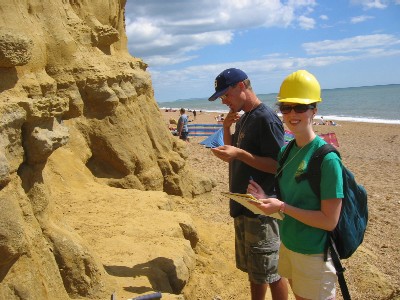 Brieanna and Gus at West Bay
Brieanna and Gus at West Bay
Links to Related Projects:
World Heritage: Conservation Efforts in the United Kingdom and Ireland. By Jeanine Riss
Geology and Tourism on the South England Coast. By Jenny Ripatti
Geology, Landscapes, and Land Use of Dorset and East Devon. By Angus Leger
Other Related Links:
Geology of the Wessex Coast, Southern England by Ian West
References and Acknowledgements:
-- Brunsden, Denys. The Official Guide to the Jurassic Coast, Dorset and East Devon Cost World Heritage Site. Coastal Publishing. Wareham, England, 2003.
-- Dorset: Coast and Countryside, Historic Towns and Villages. J. Salmon, Sevenoaks, Kent, 2006.
-- Dorset County Council (2006). Jurassic Coast. September 22, 2006. http://www.jurassiccoast.com/index.jsp
-- Detail Map: 2006 Multimap.com. September 2, 2006. http://www.multimap.com
-- The Dorset Page, 2000. September 30, 2006. http://www.thedorsetpage.com/locations/place/C180.htm
-- West, Ian (2005) Bridport Harbor - West Bay, East Cliff September 30, 2006. http://www.soton.ac.uk/~imw/bridport.htm
-- West, Ian (2005) Burton Bradstock - near Bridport, Dorset September 30, 2006. http://www.soton.ac.uk/~imw/burton.htm
Home

 Class with Dr. Dorothy Satterfield and Dr. Roger Suthren at West Bay
Class with Dr. Dorothy Satterfield and Dr. Roger Suthren at West Bay Bridport Sands formations from the Upper Lias age at West Bay
Bridport Sands formations from the Upper Lias age at West Bay
 Brieanna and Gus at West Bay
Brieanna and Gus at West Bay